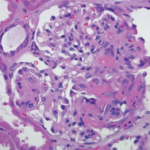The pattern of disease response and flare follows the expected time course for B cell depletion and repletion following rituximab therapy, which implies that these patients are responding to treatment with rituximab. An open question is why a consistent message regarding the efficacy of IgA vasculitis has not emerged from the literature, and whether the benefits noted in this study will persist past six months.
Another interesting observation from this study is that crescentic IgA nephropathy, which is indistinguishable pathologically from the crescentic glomerulonephritis of IgA vasculitis, is less likely to respond to treatment with rituximab and more likely to relapse. These differences imply these are pathophysiologically distinct diseases, despite their similarities.
Philip Seo, MD, MHS, is an associate professor of medicine at Johns Hopkins University School of Medicine. He served as the third physician editor of The Rheumatologist.
Author’s note
The 22nd International Vasculitis Workshop will be hosted by the Australia and New Zealand Vasculitis Society on Feb. 21–25, 2026, in Melbourne, Australia.
References
- Abstracts book, version 3. 21st International Vasculitis Workshop. 2024 Apr 5. https://zenodo.org/records/11068008
- Pagnoux C, Hogan SL, Chin H, et al. Predictors of treatment resistance and relapse in antineutrophil cytoplasmic antibody–associated small-vessel vasculitis. Arthritis Rheum. 2008 Sep; 58(9): 2908–2918.
- Walsh M, Merkel PA, Peh CA, et al. Plasma exchange & glucocorticoids in severe ANCA-associated vasculitis. N Engl J Med. 2020 Feb;382(7):622–631.
- Walsh M, Collister D, Zeng L, et al. The effects of plasma exchange in patients with ANCA-associated vasculitis: An updated systematic review and meta-analysis. 2022 Feb:376:e064604.
- Jayne DRW, Merkel PA, Schall TJ, et al. Avacopan for the treatment of ANCA-associated vasculitis. N Engl J Med. 2021 Feb;384(7):599–609.

